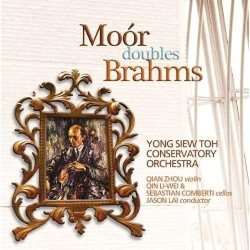| 
|
Johannes BRAHMS (1833-1897)
Concerto for violin, cello and orchestra in A minor, Op.102 (1887) [34:09] *
Emànuel MOÓR (1863-1931)
Concerto for two cellos in D major, Op.69 (1908) [26:47]
Qian Zhou (violin)
Qin Li-Wei *, Sebastian Comberti (cellos)
Yong Siew Toh Conservatory Orchestra/Jason Lai
rec. live, March 2012 (Brahms) and January 2013 (Moór), Yong Siew Toh Conservatory, Singapore
CELLO CLASSICS CC1031 [61:00]
Those who have caught the few recordings of the music of Emànuel Moór will know that he wrote for some of the elite instrumentalists of his day – it’s enough to cite just Ysaÿe, Thibaud, Enesco and Carl Flesch amongst violinists, pianists Cortot and Bauer, and cellist Alfredo Piatti. The most eminent conductors performed his music and praised it. He wrote five operas, eight symphonies and numerous concertos and chamber music. Yet he is still probably best associated with his contraption called the Double Keyboard, which enjoyed a small vogue, was extravagantly lauded but then dropped from view and indeed hearing.
Very slowly but attractively some of his music is being recorded. Cello Classics has released a disc charting his cello sonatas, which I reviewed with some enthusiasm. The rhapsodic freedom that I found in the sonatas is also apparent in the Concerto for two cellos in D major, Op.69, composed in 1908. The dedicatees were Casals and Suggia. Moór’s background embodied Hungarian and Jewish elements, but he studied in Prague and there is, in his music, a sense of lyrical cosmopolitanism (in the best sense) that I find very rewarding. His tunes have the fibre to be memorable, both poignant and beautiful in themselves. If the writing for the two instruments proves awkward, on occasion, it’s a price worth paying to enjoy such lyrically effusive passages. This is a four-movement work and he solves the problem of delineating the two solo cellos by apportioning ‘high’ and ‘low’ – one cello dealing with technical-virtuosic matters, the other adopting an attitude of painterly lyricism, and then the roles are reversed. Thus he avoids much in the way of entwining passages. It’s true that Moór’s aesthetic sometimes elides the romantic with the salon-sweet, as happens in the slow movement. It’s carried off with such mellow nobility and generosity that its solemnity wins the day. The confident finale is dispatched with brio, with real Romantic esprit – horns to the fore. Brahms is often cited when Moór’s name is mentioned but this isn’t an especially Brahmsian work. Occasionally one might think of Dvořák, though perhaps we can all look forward to the time when one can think that music sounds Moóresque.
Having cited Brahms, the coupling is his Double Concerto, composed two decades before the companion work. There is no real parallel between the two concertos, but it gives cellist Qin Li-Wei another opportunity to perform, live this time, with his colleagues. Whereas Li-Wei and Sebastian Comberti formed a most persuasive pairing in the context of a studio recording, the live Brahms with violinist Qian Zhou, and with the Yong Siew Toh Conservatory Orchestra again conducted by Jason Lai, is rather more hit-and-miss. Ensemble is rather shaky and there is some very odd, questionable phrasing. The orchestra here sounds underpowered, and there are strange orchestral balances, especially in the finale.
In short, I wouldn’t spend too much time on the Brahms: the Moór is the thing.
Jonathan Woolf
Masterwork Index: Brahms
double concerto
 |
 |
|











